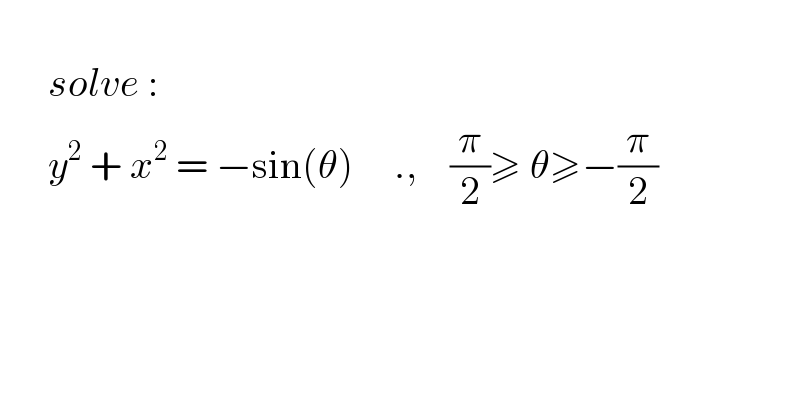Question Number 103859 by 175mohamed last updated on 17/Jul/20

$$\:\:\: \\ $$$$\:\:\:\:\:\:{solve}\:: \\ $$$$\:\:\:\:\:\:{y}^{\mathrm{2}} \:+\:{x}^{\mathrm{2}} \:=\:−\mathrm{sin}\left(\theta\right)\:\:\:\:\:.,\:\:\:\:\frac{\pi}{\mathrm{2}}\geqslant\:\theta\geqslant−\frac{\pi}{\mathrm{2}} \\ $$
Answered by mathmax by abdo last updated on 18/Jul/20
![if x and y from C let x =rcosα and y =r sinα e ⇒r^2 =−sinθ but r>0 (radius) ⇒sinθ<0 ⇒−(π/2)<θ<0 ⇒ r =(√(−sinθ)) ⇒x =(√(−sinθ))cos(α) and y =(√(−sinθ))sin(α) and ∈]0,2π[ if sinθ>0 →no solution...](https://www.tinkutara.com/question/Q103950.png)
$$\mathrm{if}\:\mathrm{x}\:\mathrm{and}\:\mathrm{y}\:\mathrm{from}\:\mathrm{C}\:\mathrm{let}\:\mathrm{x}\:=\mathrm{rcos}\alpha\:\mathrm{and}\:\mathrm{y}\:=\mathrm{r}\:\mathrm{sin}\alpha \\ $$$$\mathrm{e}\:\Rightarrow\mathrm{r}^{\mathrm{2}} \:=−\mathrm{sin}\theta\:\:\:\mathrm{but}\:\mathrm{r}>\mathrm{0}\:\left(\mathrm{radius}\right)\:\Rightarrow\mathrm{sin}\theta<\mathrm{0}\:\Rightarrow−\frac{\pi}{\mathrm{2}}<\theta<\mathrm{0}\:\Rightarrow \\ $$$$\left.\mathrm{r}\:=\sqrt{−\mathrm{sin}\theta}\:\Rightarrow\mathrm{x}\:=\sqrt{−\mathrm{sin}\theta}\mathrm{cos}\left(\alpha\right)\:\mathrm{and}\:\mathrm{y}\:=\sqrt{−\mathrm{sin}\theta}\mathrm{sin}\left(\alpha\right)\:\:\mathrm{and}\:\in\right]\mathrm{0},\mathrm{2}\pi\left[\right. \\ $$$$\mathrm{if}\:\mathrm{sin}\theta>\mathrm{0}\:\rightarrow\mathrm{no}\:\mathrm{solution}… \\ $$
Commented by mathmax by abdo last updated on 18/Jul/20

$$\mathrm{sorry}\:\mathrm{x}\:\mathrm{and}\:\mathrm{y}\:\mathrm{from}\:\mathrm{R}.. \\ $$
